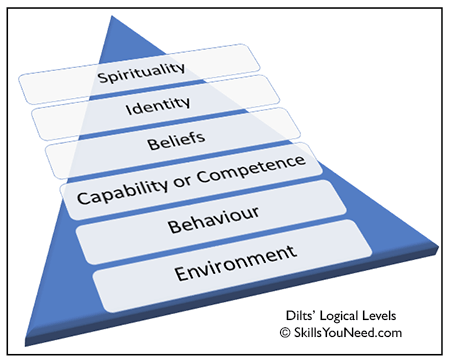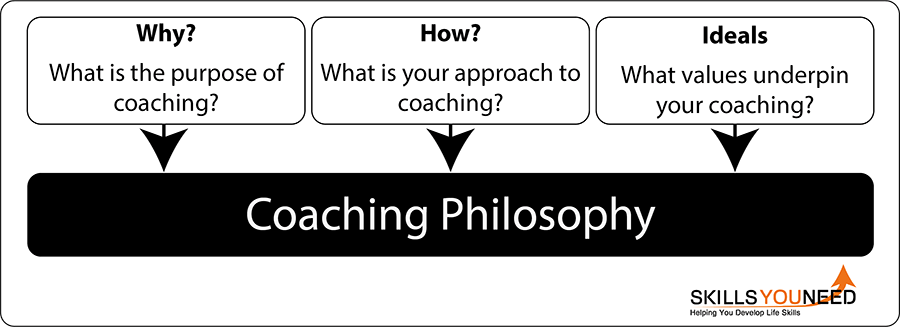Developing Your Coaching Philosophy
See also: Understanding Coaching MaturityYour coaching philosophy is the set of values, beliefs and principles that guide your coaching. These values and principles drive your approach and behaviour in both coaching and life. Everyone has these values, and they drive behaviour. However, not everyone, or even every coach, has taken the time to articulate them and be clear about them—so they are not always sure what is driving their decisions.
Consistency and clarity matter when coaching. It is therefore important to be clear about your basic coaching philosophy before you start coaching anyone. This page explains how you can start to develop a clear and coherent philosophy that reflects your beliefs and values, and will guide your coaching as you develop your skills.
Why Have a Coaching Philosophy?
Why do you need to articulate a coaching philosophy? You may feel that you already know what you value and how to behave, and have no need to write anything down.
However, there are benefits to setting out a philosophy, including:
Ideas that are not articulated are often forgotten. When you start coaching, you may believe that you are clear about what guides you. Over time, however, you may become cynical or jaded. Being able to return to your guiding principles will help you to remember why you became a coach, and what really matters.
We have many beliefs and values, and not all of them are always relevant to the situation. We all bring ‘baggage’, including values that may not be relevant in coaching—or may even be harmful! It is therefore helpful to be clear which values are guiding your approach, and which you wish to put aside.
It will enable you to coach within a clear framework and manage any ethical dilemmas. If your philosophy is clearly defined, you can set any ethical issues or dilemmas clearly within that structure. This will make it easier to avoid problems and make sure that you behave consistently.
It will help others to see if your values and principles fit with theirs. Potential clients can look at your philosophy to see if it chimes with their own values. This is helpful in ensuring a good ‘fit’ between client and coach.
It supports reflective practice.Your philosophy can be used as a framework for reflection on your practice, including with any kind of peer mentor or coach support.
Beliefs, Behaviour, and Values
It is tempting to think that coaching is all about behaviour—and, to a certain extent, this is true. Any coach will be modelling behaviours to those they are coaching. However, there is considerable evidence that behaviours are only the outward reflection of our beliefs and values.
Robert Dilts set out a hierarchy of what he called ‘logical levels’ (see diagram). The basic principle behind these levels is that each level affects the levels below—but not necessarily those above.

In other words, identity and beliefs drive how we behave—rather than behaviours driving beliefs. If you wish to change your behaviour, you therefore need to examine your beliefs and competences, and not merely your behaviour.
For most of us, beliefs are deeply held, and not often articulated. They may go right back to childhood. They are not always easy to surface—but it is important to identify those that will affect your coaching.
Starting to Develop a Philosophy
Every coach’s philosophy will be different. However, there are certain components that are generally agreed to be important. These include the objectives or purpose of coaching, your approach to coaching, your values, and your principles.
We can define these as the Why (purpose), How (approach) and Ideals (values) of coaching.

A good place to start to develop a coaching philosophy is by considering these four key questions:
Why do you want to coach (or why did you start coaching)?
What do you really like about coaching (what makes you feel good about it)?
How do you define success in coaching for you and those you coach?
What is your general approach to coaching?
When you can articulate answers to all these, you have the basis of a coaching philosophy.
Top Tip! Consider real situations
If you are having trouble answering any of these questions, it may be helpful to think about some real situations. Consider the situation, how you responded, and how that made you feel.
Your feelings about certain situations are often tied up in your beliefs. If you feel uncomfortable about how you behaved, that is probably because it was not fully consistent with a belief or value. This can therefore help you to identify values that really matter.
You can now try to write your coaching philosophy. A useful approach is to start with your objectives, move onto your core values, and then set out what approach you will use. Your coaching philosophy may be just a sentence or two, or it may be several paragraphs long. The important thing is that it sets out what you believe is important in coaching, and how that is reflected in what you do.
Your coaching philosophy also needs to be set in the context in which you coach. What is appropriate for someone coaching a national team may not fit a work context, or coaching a group of children learning a new sport.
The box below shows some examples of coaching philosophies, one from a coach at a canoe club, and one from a team leader in a large organisation. Both use the format above, and both also set the coaching into context.
Examples of coaching philosophies
“For me, coaching is about helping other people to enjoy canoeing, and to improve their skills. I want them to come back and want more. I also want them to experiment with what they do, and be prepared to try new things. I am there to support them, and provide opportunities for development. Ultimately, though, it is up to them to drive their own progress.”
“At work, coaching leadership is all about giving people confidence that they can solve their own problems. A coaching approach means I can use questions to help them think through the problem, and discuss potential issues, but in a way that lets them take the lead in the thinking process. Success for me is watching the problems that people bring to me for discussion get harder, as they get more confident in solving the easier problems themselves!”
Developing (With) Your Coaching Philosophy
Writing your coaching philosophy is only the first step. You then have to use it to guide your coaching. It needs to underpin everything that you do.
When you first start coaching, it is worth consciously considering your philosophy with each decision you make. Over time, this process will probably become more unconscious, but it is still worth going through. This will ensure that your decisions are consistent and coherent—and will also help you to justify them to yourself and others if necessary.
Your coaching philosophy will also inevitably change over time as you grow and mature as a coach (and our page on Coaching Maturity explains more about this process). You may find that you develop different values, or that you come to believe that other things are more important. These changes need to be taken into account in your philosophy. It is therefore worth reflecting on your philosophy periodically, perhaps with a peer mentor, to ensure that it changes with you—but continues to guide your practice.
Further Reading from Skills You Need
The Skills You Need Guide to Coaching and Mentoring
Coaching and mentoring require some very specific skills, particularly focused on facilitating and enabling others, and building good relationships. This eBook is designed to help you to develop those skills, and become a successful coach or mentor.
This guide is chiefly aimed at those new to coaching, and who will be coaching as part of their work. However, it also contains information and ideas that may be useful to more established coaches, especially those looking to develop their thinking further, and move towards growing maturity in their coaching.
Continue to:
Coaching Skills
What is Counselling?


